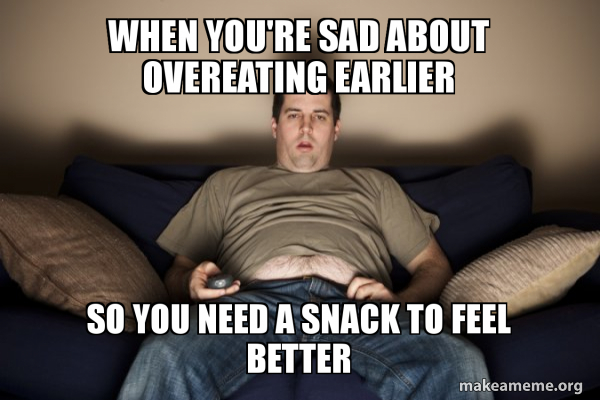
All this hubbub about food and feasting over the last week or so got me thinking about a fascinating case involving a friend. She had been morbidly overweight for years when she suddenly contracted a bad sinus infection that left her without the ability to smell. It’s no secret that our sense of smell is instrumental in our ability to taste flavors other than the basic sweet, sour, salty and bitter.
Interestingly, in spite of not being able to taste, she continued to eat like she did before; still chowing down on her favorite snacks, etc. And she was at a loss to explain why. Could it be that the habit of putting food in the mouth is more intense than the pleasure of the taste?
People addicted to drugs, alcohol, shopping and the like report similar feelings. They often say to me, “I don’t even enjoy the habit any more. But I keep doing it anyway.” Perhaps the mindless repetition creates a kind of calm – or at least a stability of sorts. Compulsions usually start out as a way to soothe anxiety. Life can be a pretty stressful place and human beings have always looked for ways to cope. Some methods work better than others, and eating is a classic example. After all, eating is universal. You must eat in order to survive. Some take this further and make eating or cooking an enjoyable hobby. Still others gorge incessantly to stop the pain or boredom that everyday life can bring.
Compulsive eating expert Geneen Roth describes the notion of “emotional eating.” She characterizes her own destructive eating as a “valiant though misguided attempt at being fully alive….” Like millions of others, Roth substituted food for self-esteem and love of life. A healthy person tries to pursue life in a cheerful and productive way. But for whatever reasons, some people don’t operate that way. The resulting unhappiness must express itself somehow. One way might be by going through a jumbo bag of potato chips or a bag of Pecan Sandies.
The problem here isn’t just the overeating. The compulsive behavior reinforces the very self-loathing that gave rise to that behavior in the first place. Self-loathing is probably the number one cause of compulsive eating. And the more you eat, the more you have “reason” to hate yourself. Talk about a vicious cycle!
Solutions are not easy, but you CAN beat a compulsion if you first understand the nature of the vicious cycle. A classic mistake people make is to use weight loss as a way to achieve self-esteem. “If I lose weight, then I’ll feel better about myself and about life.” The healthier way to approach it is to lose weight because you ALREADY love your life. “My weight is getting in the way of the happiness I deserve.” That may smack of self-help psychobabble, but the logic is undeniable: If you don’t first have the expectation of loving life and living it fully, then why bother to lose weight in the first place?
When people begin to lose hope, they tend to go through the motions; creating their own personal jail cells. If you find yourself going through the motions of eating (or any other compulsive behavior) without even gaining pleasure from it, that’s a sure sign of a compulsion. In these cases the issue isn’t the overeating; it’s that you’re not yet convinced you deserve the benefits of a healthier lifestyle.
To borrow Geneen Roth’s analogy, don’t settle for being a caterpillar when you could be a butterfly. Don’t just go through the motions, chewing and munching through your potential and your future. Set a course for whatever goal you consider worthwhile and enjoyable. Stop blaming yourself. You’re the single best ally you’ll ever have. If you shed the faulty and hopeless thinking, the weight will surely follow.
Follow Dr. Hurd on Facebook. Search under “Michael Hurd” (Charleston SC). Get up-to-the-minute postings, recommended articles and links, and engage in back-and-forth discussion with Dr. Hurd on topics of interest. Also follow Dr. Hurd on X at @MichaelJHurd1, drmichaelhurd on Instagram, @DrHurd on TruthSocial. Dr. Hurd is also now a Newsmax Insider!
